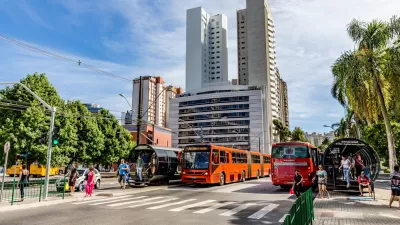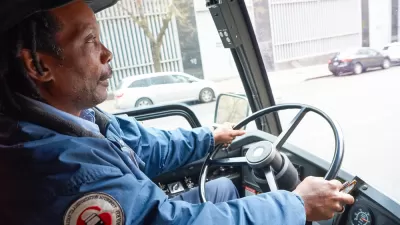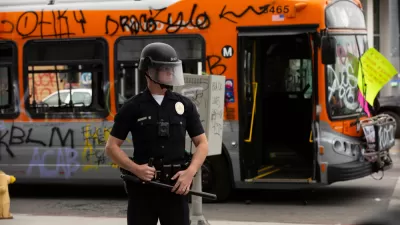'Unruly' protests by residents opposed to planned hikes in the cost of bus fares have shaken Sao Paulo and Rio de Janeiro in the past week. The country has a history of transit fare protests going back 130 years.
"Protests by an increasingly forceful movement coalescing against increases in bus fares shook Brazil’s two largest cities on Thursday night, the fourth time in a week that activists have taken to the streets in demonstrations that have been marked by clashes with security forces," reports Simon Romero. "The protesters, mainly university students but also activists from leftist political parties, appear to be loosely tied to an organization called the Free Fare Movement, which advocates sharp decreases in public transportation fares or doing away with the fares and financing transit through tax increases."
"The free-fare movement has held protests against bus-fare increases in different parts of Brazil in recent years," notes Romero. "The latest demonstrations have crystallized around resistance to new fare increases, making it the latest in a sequence of campaigns of dissent over public transportation dating to the Vintém Revolt of 1879, when protesters in Rio de Janeiro challenged Brazil’s monarchy over fares for trolley cars."
“'The hike in bus fares were the spark for this to happen,' said Maurício Santoro, an adviser here to Amnesty International. 'Public transportation in Brazil is expensive, unsafe and poorly managed, especially impacting poor commuters who have no choice but to rely on these systems.'”
FULL STORY: Bus-Fare Protests Hit Brazil’s Two Biggest Cities

Trump Administration Could Effectively End Housing Voucher Program
Federal officials are eyeing major cuts to the Section 8 program that helps millions of low-income households pay rent.

Planetizen Federal Action Tracker
A weekly monitor of how Trump’s orders and actions are impacting planners and planning in America.

The 120 Year Old Tiny Home Villages That Sheltered San Francisco’s Earthquake Refugees
More than a century ago, San Francisco mobilized to house thousands of residents displaced by the 1906 earthquake. Could their strategy offer a model for the present?

Alabama School Forestry Initiative Brings Trees to Schoolyards
Trees can improve physical and mental health for students and commnity members.

NYC Outdoor Dining Could Get a Re-Do
The city council is considering making the al fresco dining program year-round to address cost concerns from small businesses.

HSR Reaches Key Settlement in Northern California City
The state’s high-speed rail authority reached an agreement with Millbrae, a key city on the train’s proposed route to San Francisco.
Urban Design for Planners 1: Software Tools
This six-course series explores essential urban design concepts using open source software and equips planners with the tools they need to participate fully in the urban design process.
Planning for Universal Design
Learn the tools for implementing Universal Design in planning regulations.
Ada County Highway District
Clanton & Associates, Inc.
Jessamine County Fiscal Court
Institute for Housing and Urban Development Studies (IHS)
City of Grandview
Harvard GSD Executive Education
Toledo-Lucas County Plan Commissions
Salt Lake City
NYU Wagner Graduate School of Public Service





























